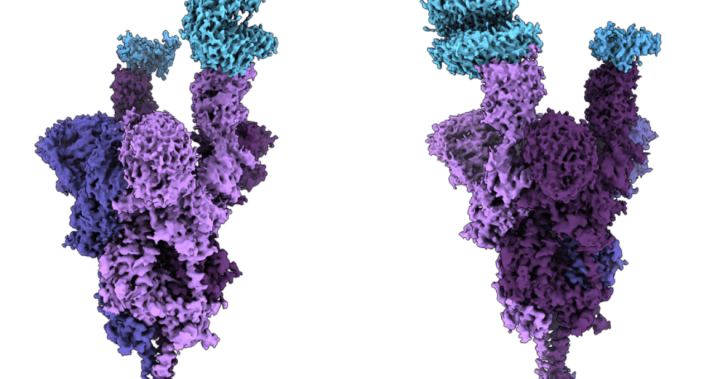UBC scientists reveal world’s first molecular-level analysis of Omicron variant’s spike protein | Globalnews.ca
Canadian researchers have conducted the world’s first molecular-level analysis of Omicron’s spike protein, revealing key information about why the new variant is so resistant and infectious.
Omicron has a “remarkable” 37 spike protein mutations, said the University of British Columbia’s Dr. Sriram Subramaniam — three to five times more than any other variant during the pandemic so far.
“Because of these mutations it’s very effective at evading the binding of antibodies that can neutralize and block its entry,” Subramaniam explained.
“At the same time, it also retains its ability to bind effectively with the cellular receptors that take it into cells. That combination of the two makes it particularly transmissible.”
Read more:
Omicron FAQ: Everything you need to know about the COVID-19 variant
Subramaniam’s team at UBC used a cryo-electron microscope to examine how the COVID-19 variant’s spike protein mutations impact Omicron’s behaviour at the molecular level.
Their research was published last week and is waiting for peer review.
It found that some of Omicron’s mutations create “salt bridges” and hydrogen bonds between the spike protein and human cell receptors that seem to increase the strength of their attachment to human cells, while another one of its mutations decreases that strength.
Overall, its binding ability surpasses the original SARS-CoV-2 virus and is more comparable to the Delta variant.

The molecular-level analysis provides a “map” of interactions that could allow researchers to develop more effective therapies against Omicron, said Subramaniam.
For now, however, the team’s research indicated that vaccines are the best defense.
“There’s less evasion of the antibody response, less evasion of the virus with individuals who have been double-vaccinated,” explained the professor of molecular biology and biochemistry.
Read more:
Canadians should ‘hunker down’ to slow Omicron spread, Trudeau says
Cases of the Omicron variant in Canada are rising rapidly with more 2,360 infections confirmed to date.
Provinces from coast to coast have enacted new public health restrictions to curb its spread, and top doctors across the country suggest Omicron could soon be the dominant variant of COVID-19.
Last week, Canada averaged just over 5,000 new COVID-19 infections per day. On Tuesday, it reported more than 11,000 new infections nationwide.
Since COVID-19 arrived in Canada in January last year the country has seen close to two million infections and just over 30,000 deaths.
With files from Aaron D’Andrea and Leslie Young
View link »
© 2021 Global News, a division of Corus Entertainment Inc.
For all the latest health News Click Here




